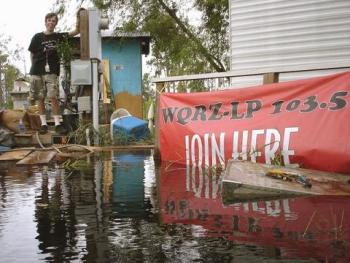WQRZ: A Real Lifesaver

Food, water, and WQRZ-tuned radios: that's what FEMA gave out in Hancock County, MS after Hurricane Katrina. One of just four Gulf Coast radio stations to survive the 2005 disaster, WQRZ was the area's only point of contact for ten days. Commercial broadcasters abandoned their posts, but WQRZ had moved to a higher location just two days before to ensure it could stay on the air. "We're good at moving," said station manager and engineer Brice Phillips. "We can operate in any circumstances -- without any phone lines, internet or wireless hookup."
WQRZ broadcast recovery efforts, rescues, and where to find drinkable water. Each of the station's eleven volunteers is well-trained in engineering and how to function in emergencies, making the weeks of 24/7 broadcasting easier. The FCC allowed WQRZ a higher wattage for ninety days after Katrina. Five thousand people petitioned for an extension. However, the FCC did nothing, even after Phillips received the Small Business Association's Phoenix Award for Outstanding Contribution to Disaster Recovery in 2006.
The station is still deeply connected with its community. Locals perform in its Sunday night theater program, advertise for lost pets, and listen to local music festivals live on the station. Phillips is asking local schools if they want to move production of their school news shows to WQRZ. And, through the station's police dispatcher, Phillips is kept aware of the problems in his county. He noticed that most local domestic violence calls are made on Sunday between 6 and 8 PM, and wants a domestic violence PSA he can put into heavy rotation then.
WQRZ is also strongly committed to Hancock County's disabled community. Speaking from experience, "In a small community, people who are locked or shut in want to get involved, and radio allows them to do that," Phillips said. Radio frees disabled people to do their thing without getting pity they don't want or need. "We aren't judged because they can't look at us," said Phillips. "Disabled people here feel like a person." In the ten years WQRZ has been operating, Hancock County has "a newfound respect for disabled people."
The station has also raised voter participation in the years it's been around. The station hosts "Free Speech" most days of the week, a call-in show and the only time WQRZ turns its delay system on. "We rarely have to use it," Phillips added. The show often hosts public officials, to whom WQRZ gives an hour of airtime whenever they ask. Sometimes whistle-blowers call in.
Hancock County, formerly one of the nation's poorest, is now one of the richest because of Katrina aid. "We've gotten more than five billion dollars," said Phillips. But who actually has it? WQRZ is one of the few outlets willing to talk about the indictments and scandals around the money's mismanagement. After 2008's Hurricane Gustav, the local Emergency Operations Center told the station to broadcast that people should donate their money to the local Chamber of Commerce. Phillips knew that was illegal, and refused. The EOC said "Get out." The station said "Fine." Phillips tells the truth when he says that, "for a baby station, we're rockin' the boat with the big boys."
WQRZ's format changes daily. "Don't like what you hear? Wait five minutes!" WQRZ is the only Gulf station to play blues music, which it does every Tuesday. On WQRZ's morning show, volunteers read from the local newspaper. Often, people who are still learning to read will participate, to encourage literacy. Local music, spoken word and poetry are the name of the game on Monday. Local artists are broadcast live from WQRZ's porch on Monday nights. "The KKK is still pretty present here," said Phillips, on nasty comments about World Music Wednesdays.
Though the station is in Mississippi, it's in New Orleans's broadcast area. The county didn't get much relevant information before WQRZ: storm warnings came five minutes too late, because they usually get to Hancock County before they reach bigger broadcasters. The area needed a more reliable source of information and Phillips rose to the occasion. WQRZ's application process began in September 2000, and their application was one of 255 to go through before the FCC changed the rules for LPFMs. The Hancock County Amateur Radio Association, Inc. is WQRZ's licensee. Ham radio operators recognize the station's call sign as the Q-code "QRZ," meaning "Who is calling me?" "We answer all those who call on us," said Phillips, so QRZ was only fitting.
Phillips wants other LPFMers to know that no matter what happens, "You have to be resilient as the voice of the community." The station's commitment to principle has paid off. "You don't think you're making any change, but looking back after ten years...we smoked the rest. Commercial radio can't touch us!" Phillips didn't know who was listening during the storms he faced alongside Hancock County, but after a PBS special, letters poured in for almost two months. "You get to the point of what is your life about, watch it all get flushed all down the toilet in twelve hours...twice!" But those letters rejuvenated him. "I'm gonna keep doing this 'til I go broke, even if the local government never supports me." Let's hope he does: after two huge hurricanes Hancock County, Mississippi's almost completely self-supported WQRZ does more for its community than any commercial station.
Sign up now to start a station or learn more!
Thanks to Lucy Saunders-Pappentick for putting together this profile.
